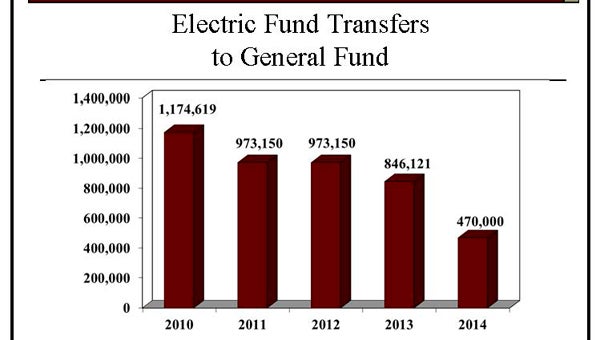Going down: Revenue transfer less and less over recent fiscal years
Published 7:36 pm Wednesday, January 21, 2015

COURTESY OF CITY OF WASHINGTON
COMING DOWN: The annual transfer of revenue from the city’s electric fund to the city’s general fund has decreased since fiscal year 2010.
Washington’s City Council is keeping its promise regarding decreasing the annual transfer from the city’s electric fund to the city’s general fund, according to the latest audit of the city’s fiscal records.
That annual transfer fell from $1,174,619 in fiscal year 2010 to $470,000 in fiscal year 2014, according to the audit performed by Martin Starnes & Associates. The council has been working toward reducing that annual transfer for several years, with the goal of eliminating that transfer. The transfers have been made to help balance past city budgets.
Many Washington Electric Utilities customers who don’t live in the city object to transferring money from the electric fund to the general fund. They contend that at least part of the money they pay on their electric bills is used to subsidize city operations, services and programs.
Some city officials, including former City Manager James C. Smith, have said the transfer from the electric fund to the general fund is similar to a private power company like Duke Energy paying a dividend to its stockholders. Eliminating the annual transfer — or reducing it — and making the general fund self-supporting likely would require finding revenue sources to replace the transfer amount, cutting expenses or a combination of the two, city officials have said.
“The state likes to see no more than 3 percent of gross fixed assets transferred from your electric fund to your general fund. So, you can see here that you’re your electric fund (transfers) for your five-year trend are going down, the amount you’re transferring out to your general fund,” Crystal Roberts, spokeswoman for Martin Starnes & Associates, told the council during its Jan. 12 meeting. “And for fiscal year (2014), that was .75 percent of your gross fixed assets for your electric fund, and in the prior year it was at 1.4 percent.”
The city’s policy is to limit such transfers to no more than 3 percent, according to Matt Rauschenbach, the city’s chief financial officer and director of administrative services.




